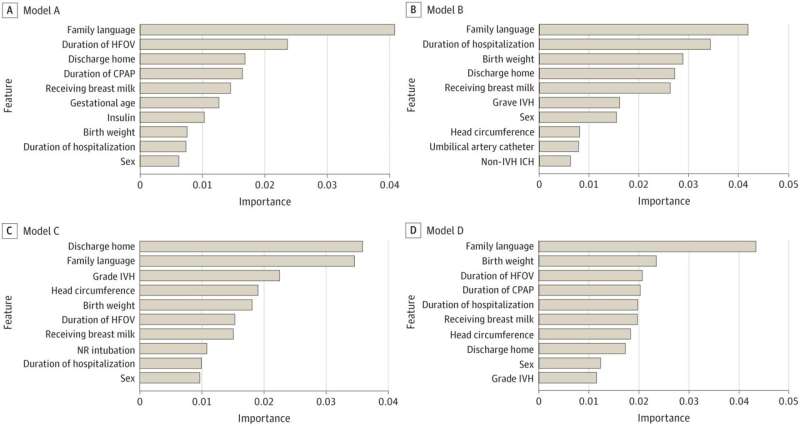This article has been reviewed according to Science X's editorial process and policies. Editors have highlighted the following attributes while ensuring the content's credibility:
fact-checked
peer-reviewed publication
trusted source
proofread
Cognitive impairment in preterm infants can be predicted at time of discharge from NICU

Impaired cognition among preschoolers born very early can be predicted already at discharge from neonatal care. This is according to a study from Karolinska Institutet, Sweden, and University College Cork, Ireland, published in the journal JAMA Network Open.
Based on data from the Swedish Neonatal Quality Registry, the researchers have mapped 90 characteristics during pregnancy, delivery and neonatal care of Swedish children born prematurely, in pregnancy weeks 22–31. The researchers used machine learning (AI) to identify the most important risk factors for delayed cognitive development. In total, the study included 1,062 very preterm babies with an average birth weight of 880 grams, all of whom had been psychologically tested for cognitive outcome at the age of 2 years.
Using machine learning, 64 out of 90 traits, neonatal conditions and exposures were ruled out as they were not associated with the child's future development. By analyzing the remaining 26 risk factors in a predictive model, 19 out of 20 (93%) very preterm infants who would later exhibit delayed cognitive development could be identified at the time of discharge from the NICU.
It is already known children born very preterm are at risk of later cognitive difficulties. However, it is currently difficult to predict at the individual level which children are most at risk, and which children would benefit most from preventative interventions.
"This is an important step towards tailoring preventative interventions to the most needy children already upon discharge from neonatal intensive care. There is effective help available today, but it is often very resource-intensive and therefore may not be available to everyone. Therefore, new prediction tools like the one we developed are needed," says Mikael Norman, Professor of Pediatrics at the Department of Clinical Science, Intervention and Technology, Karolinska Institutet, Stockholm, Sweden and lead researcher of the study.
Of all the children examined, 231 children (21%) screened positive for delayed cognitive development at age 2. In addition to known risk factors such as low birth weight, male gender and neonatal cerebral hemorrhage; non-Scandinavian home language, prolonged ventilator treatment and lack of breastfeeding at discharge from neonatal care were identified as important risk factors for delayed cognitive development 2 years after discharge.
The study was based on the follow-up program set up by the Swedish Neonatal Society for very preterm babies, and on reporting to the Swedish Neonatal Quality register for neonatal care. The data analysis was done in collaboration with Professor Deirdre Murray, Dr. Andrea Bowe and Prof Gordon Lightbody at the INFANT research center, University College Cork, Cork, Ireland, and Prof Anthony Staines in Dublin City University, Ireland.
More information: Andrea K. Bowe et al, Prediction of 2-Year Cognitive Outcomes in Very Preterm Infants Using Machine Learning Methods, JAMA Network Open (2023). DOI: 10.1001/jamanetworkopen.2023.49111



















